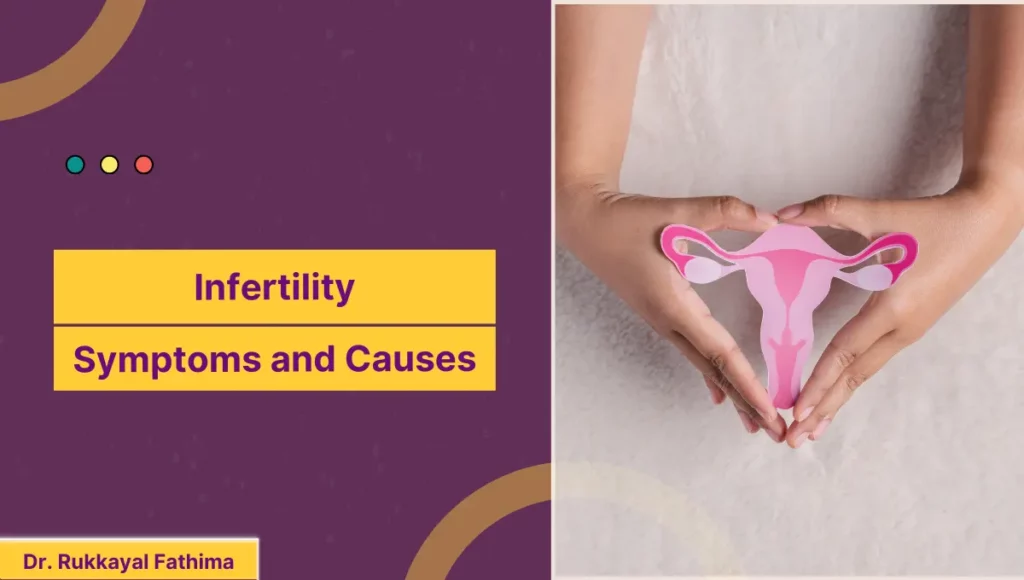Infertility is the inability to produce offspring through sexual intercourse. Any person who has difficulty or is unable to reproduce naturally is called infertile.
Infertility is a global issue, with over 48 to 186 million people in the world being infertile. A person is considered infertile when they cannot get pregnant after one year of regular unprotected sexual intercourse.
What causes infertility?
Infertility may result from either or both partners having problems with their reproductive systems. There are many causes of infertility in both males and females.
Sometimes, the cause of infertility cannot be found. Some known causes for female and male fertility problems are listed below.
What causes infertility in women?
Ovulation disorder: Ovarian disorders such as polycystic ovary syndrome (PCOS), hypo or hyperthyroidism, and hyperprolactinemia can affect ovulation, disrupting the menstrual cycle and causing infertility.
Age: Aging is a major cause of infertility in women. As women age, the quality and the number of eggs produced deteriorate.
Endometriosis: A situation where tissues that grow inside the uterus start growing outside the uterus.
Uterine disorders: Any abnormalities with the structure of the uterus can cause infertility. E.g., uterine fibroids and uterine septum.
Fallopian tube damage: Damage in the fallopian tubes caused by pelvic inflammatory disease or ectopic pregnancy can cause infertility.
Cancer and treatments: Cancer, especially those related to reproductive organs (breast and cervical cancers), and the following treatments (radiation & chemotherapy) can affect a woman’s fertility.
What causes infertility in men?
Hormonal issues that arise due to problems with hormonal glands, including the pituitary, thyroid, hypothalamus, and adrenal glands, can affect the functions of the male reproductive system.
Immunity problems, where your body creates anti-sperm antibodies against your own sperm.
Infections or inflammatory diseases like epididymitis (inflammation of the epididymis) and orchitis (inflammation of testicles).
Heredity and genetic diseases like hemochromatosis and cystic fibrosis.
Environmental factors include heavy exposure to industrial chemicals (pesticides, organic solvents, etc.), radiation (X-Ray), and heat.
Lifestyle factors like usage of alcohol, tobacco, steroids or marijuana. Obesity can also cause infertility by causing hormonal changes in the body.
What are the types of infertility?
There are two types of infertility. They are primary and secondary infertility.
Primary infertility: Primary infertility is when a person who has never had a child can’t conceive even after regular, unprotected intercourse for a year.
Secondary infertility: Secondary fertility is when a person who has had at least one successful pregnancy is unable to have a child again.
What are the risk factors for infertility?
It’s common for people to discover their fertility issues only when they fail to conceive after a year of trying. Infertility doesn’t have obvious symptoms. But some signs can indicate infertility.
- Age can be a crucial factor for infertility issues in men and women (35 for women, 40 for men).
- Excessive alcohol, smoking, and drugs.
- Hormonal issues such as thyroid, adrenal glands, etc.,
- Chronic diseases like diabetes, lupus, hypertension, etc.
- Exposure to toxic chemicals (pesticides, organic solvents, etc.), heat, and radiation (X-Ray).
- Being Overweight (obesity) can also cause infertility in both men and women.
What are the risk factors for male infertility?
Some risk factors that can cause infertility in men are
- Varicocele – a lump or swelling caused by dilated or enlarged veins that drain the testicle,
- Hydrocele – a lump or swelling in the scrotum that occurs when fluid collects in the fold of the mucous membrane that surrounds the testicle,
- Exposure of testicles to high temperature from excess use of hot tubs or saunas or wearing tight clothing,
- Infections or inflammatory diseases like epididymis (inflammation of the epididymis) and orchitis (inflammation of testicles),
- Injury in the scrotum or scrotum,
- Premature ejaculation or retrograde ejaculation (semen flows backwards into the bladder),
- Excessive usage of alcohol, smoking and drugs, and
- Being overweight (obesity).
Diagnosis and tests
Once a couple has found that they are having issues with their fertility, it is better to consult a fertility doctor as soon as possible.
The fertility doctor will conduct a series of tests on the male and female partners to diagnose the cause of infertility. The tests that will be performed on women and men are given below.
How is female infertility diagnosed?
There are some tests that can be done on a female to diagnose the cause of infertility. Given below are some of the tests that are done on a woman.
Ovulation testing: An ovulation kit may be used to detect changes in the body during ovulation, i.e., a surge in hormones such as Luteinizing Hormone (LH), prolactin, and progesterone.
HSG (Hysterosalpingography): During HSG, an X-Ray contrast is injected into the uterus, and an X-Ray is taken to check problems in the uterus. This test can also be done to detect problems in the fallopian tubes.
Ultrasound – Ultrasound testing such as follicular monitoring, transvaginal ultrasound and saline sonogram can be done to detect problems in the reproductive system.
Endoscopy – Endoscopy procedures such as laparoscopy and hysteroscopy are done to detect issues in the outer and inner layers of the uterus that can cause infertility.
Pelvic exam – A pelvic exam, including a pap smear, is done to check for structural problems or signs of disease.
How is male infertility diagnosed?
Below are some tests that can be done on a male to diagnose the cause of infertility.
Sperm Analysis: This test is done to examine factors such as sperm count, sperm motility (movement), shape (morphology), and other characteristics of the sperm.
Specialised Sperm Function Tests: This test determines whether the sperm can penetrate the egg and if there are issues with the sperm binding itself to the egg.
DNA Fragmentation Index (DFI): This test determines the quality of sperm by detecting any damage to the DNA of the sperm.
When should you seek help for infertility?
There are no specific causes or symptoms of infertility. So most people don’t discover their infertility issues until it is too late. Here are some instances that require you to seek the help of a fertility doctor.
- Women under the age of 35 who can’t get pregnant even after regular, unprotected intercourse for a year.
- Women over the age of 35 who can’t get pregnant after 6 months of regular, unprotected intercourse.
- Men who suffer from erectile dysfunction or premature ejaculation.
- Men who feel discomfort or pain in the testicle area.
- Men who have a history of prostate, testicle, or sexual health problems.
How is female infertility treated?
Some female fertility treatments that can be done are as follows.
Ovulation induction

Ovulation induction is a hormonal therapy that simulates the production of eggs in the ovaries, i.e., ovulation. This drug is administered to women who don’t ovulate regularly on their own—women with irregular periods
Surgery

Endoscopic surgeries such as laparoscopy and hysteroscopy can be done to treat problems with the uterus, like endometrial polyps, fibroids, etc. Tubal surgeries can be done to open blocked fallopian tubes and other issues in them.
Counselling

Fertility counselling is a psychotherapy treatment designed to help women understand infertility and how they feel about it.
How is male infertility treated?
Some male fertility treatments that can be done are as follows.
Surgery

Surgery is the best way to treat issues like varicocele and hydrocele. Cases such as prior vasectomies or obstructed vas deferens can be treated through surgery.
Counselling

Counseling can help men with issues such as premature ejaculation and erectile dysfunction.
Medication

he levels of hormones such as testosterone can be increased through medication. This can help with issues like erectile dysfunction.
What are the fertility treatment options for all genders?
In cases where the couple needs external help to get pregnant, they can go for Assisted Reproductive Technology (ART). This method helps the couple get pregnant through artificial means. Below are some assisted reproductive techniques that couples can undergo to get pregnant.
In Vitro Fertilisation (IVF)
IVF is the most common method of Assisted Reproductive Technology (ART). Here, the eggs and sperm are collected from the female and male and fertilised in a lab dish. The fertilised embryo is then transferred into the uterus for further development.
Intracytoplasmic Sperm Injection (ICSI)
ICSI is a type of IVF where instead of placing an egg among several sperm for fertilisation, a single, healthy sperm is selected and injected into the cytoplasm of the egg.
Intrauterine Insemination (IUI)
In IUI, fertilisation happens within the female reproductive system. Sperm is collected and placed directly into the uterus using a long, thin tube.
Third-party ART
This procedure involves a third party, i.e., someone or something unrelated to the male and female partners. It may be a donor egg, donor sperm, or donor embryo, or it may even involve a surrogate (a person who carries and gives birth to a baby in the place of the female partner).
How can I prevent infertility?
In today’s industrial era, many men and women suffer from infertility problems. Environmental and health factors play an important role in infertility. Here are some of the measures you can take to prevent infertility.
- Eat balanced and healthy food. Avoid eating fast foods too much.
- Maintain a healthy weight. Obesity is one of the major causes of infertility.
- Exercise regularly. Staying physically active can prevent many diseases, but don’t overdo it.
- Reduce intake of alcohol, smoking and drugs.
- Treat sexually transmitted infections (STIs) if you have any.
- Have children when you are ready, don’t delay. For some people, age might be the main factor for infertility. So try to have children when you are young. If you wish to delay having children, you can preserve your eggs or sperm through fertility preservation.
Health habits to boost fertility
If you are planning to get pregnant, you may be wondering what you can do to increase the chances of fertility. Your health habits are one of the major factors that can affect your fertility. So following a healthy lifestyle is important to increase your chances of fertility. Here are some of the health habits that can boost your fertility.
- Prioritise your sleep. Irregular sleep can impact almost all aspects of our life. It can also cause infertility. So stick to your sleep schedule and get a healthy amount of sleep daily.
- Limit your caffeine consumption. Studies show that high caffeine consumption increases the chances of miscarriage.
- Exercise. Just like sleep, exercise can impact almost all aspects of your life. Exercise regularly and keep your body healthy.
- Don’t have too many sweets. Too many sweets can increase your chances of obesity and diabetes, which can cause infertility.
- Reduce alcohol, smoking and drugs. Excess intake of alcohol, smoking and drugs can cause health issues and affect your fertility.
Conclusion
Infertility is one of the most challenging health issues affecting most men and women. It can also affect your physical and mental health and cause relationship problems.
Treating infertility as soon as possible is the best way to cure infertility. So if you feel like you are having any fertility issues, consult a fertility doctor immediately.
Frequently asked questions
According to the Indian Society of Assisted Reproduction, India has an infertility population of over 27.5 million. However, there are not many discussions done regarding infertility issues and the public ignorance that causes it.
When consulting your fertility doctor, ask the following question.
- What causes infertility?
- What is the best treatment for my infertility issue?
- Are there any side effects of infertility treatment?
- How effective is IVF treatment?
- Should my partner and I both undergo fertility tests?
Infertility is a major issue that is affecting millions of people who are of reproductive age worldwide. According to World Health Organization (WHO), almost 48 million couples and 186 million individuals have fertility problems globally.
In almost 90% of cases, infertility can be treated through conventional medical therapies like medication or surgeries. If these fertility treatments are unsuccessful, you can undergo assisted reproductive techniques such as IVF, ICSI, etc.
Women have the best chances of getting pregnant when they are in their 20s. This is the age when their body will produce a large number of healthy eggs.





